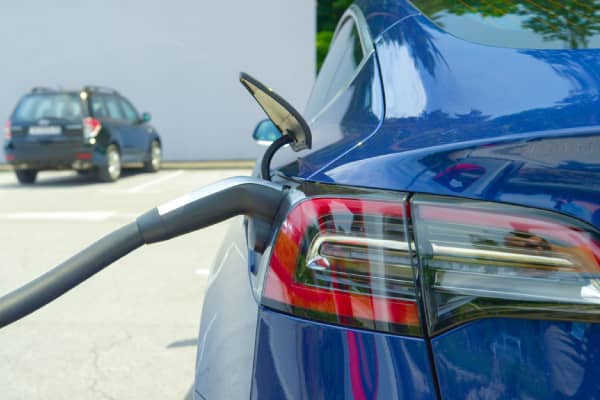
Electric cars, commonly known as EVs, are renowned for their dependability, advanced technology, swift acceleration, and significant reduction in emissions. Their growing popularity is linked to numerous benefits such as tax incentives, fuel cost savings, performance quality, design aesthetics, and increasing affordability.
Distinguishing Electric Cars: BEV vs PHEV
Battery Electric Vehicles: Powered by an electric motor and a high-voltage, lithium-ion battery, battery electric vehicles (BEVs) operate entirely on electricity. Unlike their hybrid and gasoline counterparts, BEVs eliminate the need for refueling at gas stations. Most electric car owners have charging stations installed at their homes. They also frequently benefit from a network of public charging stations within their local communities.
Plug-in Hybrid Vehicles: Plug-in hybrid electric vehicles, commonly known as PHEVs, combines elements of conventional gasoline-powered cars with electric cars. They are equipped with both a battery and electric motor as well as a gasoline tank and an internal combustion engine. Unlike their traditional hybrid counterparts, PHEVs have a larger battery capacity and require charging just like fully electric cars. However, unlike fully electric cars, PHEVs also have gasoline components that need to be refueled at gas stations.
The Main Benefits of Electric Cars
- Convenient home/residential charging: Electric cars permit easy charging at home throughout the night, often offering a more hassle-free alternative to traditional fueling stations.
- Economical fuel costs: As electricity often costs less than petrol or diesel, running electric vehicles (EVs) can be more cost-effective in the long term.
- Environmental considerations: Electric vehicles emit no tailpipe pollutants, thus lowering emissions that contribute to global warming and air pollution.
- Reduced noise pollution: Generally quieter than vehicles with internal combustion engines, electric vehicles aid in decreasing noise pollution, especially in city settings. The lower emissions from electric cars enhance air quality, potentially benefiting overall public well-being.
- Smooth drives and quality performance: Electric cars enable silent, smooth rides and robust acceleration, enhancing the overall driving sensation.
- Tax incentives: In addition to the federal government, many state, municipal, and local governments provide incentives such as tax deductions, rebates, and grants for driving and owning electric vehicles.
Servicing Electric Cars
Compared to their PHEVs, standard hybrids, and traditional gasoline cars, electric vehicles generally require less maintenance. This is because electric vehicles usually have fewer moving parts and lack an internal combustion engine. Most electric car maintenance revolves around its lithium-ion battery.
However, electric cars are still cars. Just like any other car, consistent maintenance is key.
How Often Do Electric Cars Need Maintenance?
| Maintenance Schedule | Battery Electric Vehicles (BEV) | Plug-in Hybrids (PHEV) | Gasoline Cars |
|---|---|---|---|
| Every 6 months OR every 6,000 miles (9,657 km) | Battery inspection | Battery inspection | Battery inspection |
| Every 7,500 miles (12,070 km) | Brake system inspection | Brake system inspection | Brake system inspection |
| Every 36,000 miles (58,000 km) | Cabin air filter replacement | Cabin air filter replacement | Cabin air filter replacement |
| Every 30,000 to 150,000 miles (48,300 to 241,400 km) | Cooling system inspection | Cooling system inspection | Cooling system inspections |
| Every 3 to 6 months OR every 6,000 to 7,500 miles (9,657 to 12,070 km) | X | Engine oil change and filter replacement | Engine oil change and filter replacement |
| Every 30,000 to 60,000 miles (48,300 to 96,600 km) | X | Fuel system maintenance | Transmission fluid maintenance |
| At least twice per year | High-voltage component inspection | High-voltage component inspection | High-voltage component inspection |
| Every 7,500 miles (12,070 km) | Tire care, including rotations, balancing, pressure, etc. | Tire care, including rotations, balancing, pressure, etc. | Tire care, including rotations, balancing, pressure, etc. |
| Varies with vehicle manufacturers; info. can usually be found in the infotainment system | Vehicle software updates | Vehicle software updates | Vehicle software updates |
| Every 15,000 miles (24,200 km) | Windshield wiper blade replacement | Windshield wiper blade replacement | Windshield wiper blade replacement |
Visit TOS Auto Repair in Citrus Heights, California, for professional electric vehicle maintenance services. Our facility is equipped with all the essentials to ensure your EV remains in top shape, giving you the peace of mind to hit the road again. Book your appointment online or give us a call at 916-348-1696 today!
